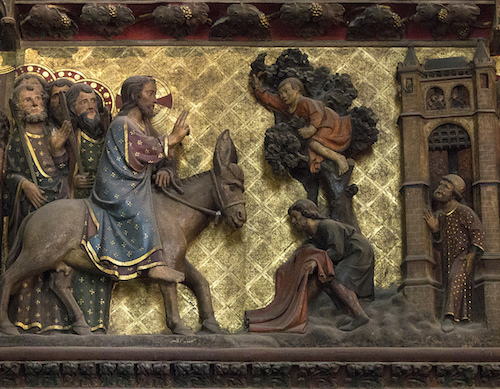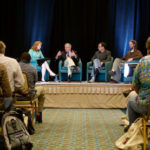We run our website the way we wished the whole internet worked: we provide high quality original content with no ads. We are funded solely by your direct support. Please consider supporting this project.

Palm Sunday, Partisan Politics & the Power of the Cross
Today we’re sharing something from David D. Flowers that we found especially insightful as we approach holy week. We hope it blesses you and moves you to more fully manifest the kingdom that is not of this world.
~~~
We remember it in the church as Palm Sunday. This is the triumphal entry of Jesus into Jerusalem. It’s the day when Jesus of Nazareth pre-planned a comical, yet prophetic event, in order to fulfill Zechariah’s prophecy of the coming Messiah (Zech 9:9).
Jesus literally acts it out.
It’s no coincidence. At the same time Pilate is parading in on the west side of the Temple to oversee Passover, ready to put a stop to any chaos that might ensue, Jesus decides to ride into Jerusalem on a donkey. He’s not on a war horse wielding a sword, he’s on a donkey. And he’s not packing.
Think about that.
Not quite the entrance folks were expecting from their Messiah.
Nevertheless, the crowds give him a royal welcome. They shouted, “Hosanna to the Son of David! Blessed is he who comes in the name of the Lord!”
And all of this to the waving of palm branches, symbolic of Messianic deliverance to the Jews, clearly harkening back to the time the Maccabees threw off Greek rule in Judea. Everyone understands this scene.
This is it. It’s Jesus’ time to prove himself as the long-awaited Messiah, the son of God. Will he go to the Antonio Fortress, where the largest garrison of soldiers are housed in Jerusalem, where Rome kept an eye on things? No doubt, the crowd could quickly turn into a mob and rush the place.
But he doesn’t take a right for the fortress, instead he goes left through the eastern gate, and into the Temple. He goes in, looks around, and according to Mark’s gospel, he leaves and returns the next day for some prophetic theater in the spirit of Jeremiah. We all know what happens next.
He wasn’t “cleansing” the Temple. He was shutting it down.
By the end of the week, Jesus had pretty much peeved everyone off. And early Friday morning Jesus is standing before Pilate saying:
“My Kingdom is not an earthly kingdom. If it were, my followers would fight to keep me from being handed over to the Jewish leaders. But my Kingdom is not of this world.” John 18:36 NLT
He said his kingdom is not of this world. Wait… what?
What does Jesus mean that his kingdom is not of this world?
Click here to read the rest of David’s thoughts.
Photo credit: Lawrence OP via Visual Hunt / CC BY-NC-ND
Category: General
Tags: David D. Flowers, Easter, Politics, Upside-Down Kingdom
Related Reading

Rekindling an Old Debate: How to be a Christian Citizen
Back in 2008 Greg joined Shane Claiborne and the now deceased Chuck Colson with host Krista Tippet on NPR’s On Being program to debate what it means to be a Christian citizen. Given the current political climate and a renewed interest in this conversation NPR decided to re-release it. If you’d like to view the discussion…

A Response to Tony Campolo on Fighting the Powers
While I have nothing but admiration for Tony Campolo, I differ with his views on how Christians are to be change agents in the world. He has always been a strong proponent of Christians bringing about change by political means. I, on the other hand, am not in principle opposed to Christians engaging in politics,…

Not the God You Were Expecting
Thomas Hawk via Compfight Micah J. Murray posted a reflection today titled The God Who Bleeds. In contrast to Mark Driscoll’s “Pride Fighter,” this God allowed himself to get beat up and killed while all his closest friends ran and hid and denied they even knew him. What kind of a God does this? The kind…

Podcast: Emergency Election Episode
Greg discusses the election. http://traffic.libsyn.com/askgregboyd/Episode_0071b.mp3

A Kingdom Not of This World
Bruxy Cavey spoke at Woodland Hills Church back in May as a part of the Tapestry series, and this is a little snippet of his sermon. It’s a wonderful description of the Anabaptist approach to politics. Take a look!

Can the Church Make Any Real Progress in the Politics of this World? (podcast)
In this episode Dan challenges Greg on whether Christians can make any progress in the world. episode 26 Links: Greg’s book: “The Myth of a Christian Nation“ http://traffic.libsyn.com/askgregboyd/Episode_0026.mp3
